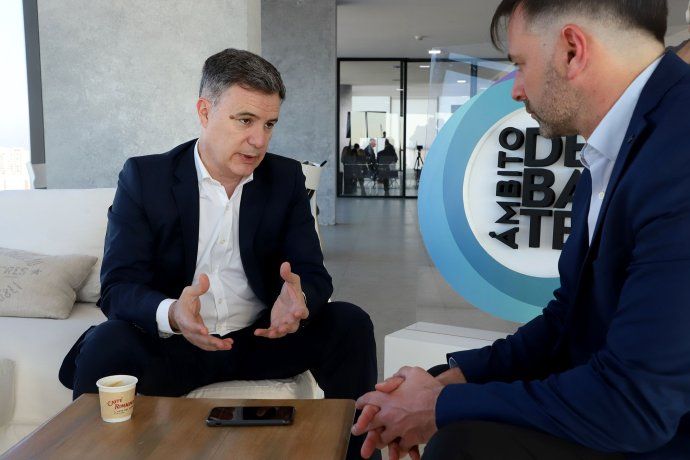Q: Can this rebound be sustained for the rest of the year?
PS: We think so. There are several factors that influence the market. First, there is more financing, a low interest rate. There is more accessible financing for people. Then, brands in general are making an effort, all of them, in terms of promotions and discounts. Financing is also at rates subsidized by brands. And then there is an unexpected effect, but one that must be recognized: the impact on the market when the exchange rate gap increases; many people do the math in parallel dollars and say: “Is it worth changing the car?” And they go and change the car.
Q: Are these benefits for brands linked to the fact that they have more stock than they expected for this period?
PS: It has to do with two things. First, yes, indeed, in the first months of the year, as the market had a very long standstill, there was a lot of stock in the dealer networks. So, it was necessary to make that stock of vehicles circulate, to make it turn. Now it has more to do with keeping the factories at a minimum level of activity, keeping the factories operating. One always tries to defend a minimum volume so that the equation is profitable. That is what we are doing now.
PABLO SIBILLA Renault Scope Debate CEO Quote
Mariano Fuchila
Q: Was there a production adjustment at the plant?
PS: Yes, we made a very good agreement, to be honest. A very mature agreement with the Smata union, in which we reduced our work schedule to six hours instead of eight hours. With that we also have a way of taking care of or preserving work instead of making another voluntary retirement plan. Until the end of the year, to see a little about the market timing.
Q: The industry did show a significant decline, with a 40% decline in June compared to 2023. That sounds like a very large number. How are you seeing that?
PS: We have a decline in the Argentine market, and also in exports. Because many markets to which we export have experienced declines. Colombia, which is a market that receives our cars, has been going through a difficult time for two years now, the market has fallen a lot. Brazil, too. It is a combination of, I would say, three factors. The Argentine market that fell, many export markets that fell, and then a bit of an adjustment once the companies level out the stock levels that we were talking about before, so as not to repeat that stock peak.
Q: You had a meeting with the government, with Luis Caputo. What is your assessment of the requests you made? What were the specific complaints and how was the minister’s reception?
PS: This is the second meeting that we have had between all the presidents of the terminals with the minister. We had agreed, precisely, after the first meeting, which was very productive, to have frequent meetings with him every two or three months, in order to evaluate the measures that are being taken, and also so that he can directly feel the pulse of the industry. I prefer not to give the details, because we have a confidentiality agreement on what we talked about there, so that the minister can evaluate the actions, and then, based on his economic possibilities, decide where they can be implemented. What I can say is that all the actions we discussed are, first, closely linked to improving Argentina’s competitiveness in the face of export markets. That, for us, would be the main request. That is, we have to work to improve the country’s competitiveness not only now, but in the long term as well. Little by little, lowering the tax burden, which is one of our requests, because lowering the tax burden lowers the price of cars, and the market grows again and generates more employment, and the whole circle is virtuous. As a positive message, the minister has been very well received.
Q: You recently mentioned that the automotive industry was excluded from the RIGI, following the changes made in the Senate. Is there any specific request, either in the regulations or with a project outside the Ley Bases, for the automotive industry to be included in an incentive regime?
PS: Yes, indeed, one of the requests we are making is that, through regulation, if possible, or perhaps through the law on electromobility or sustainable mobility, we can achieve something similar to what the RIGI is. The RIGI is not only the tax package of benefits and investment incentives, but, as we were saying, what it provides is stability, super clear rules of the game going forward. We compete with other countries where our own brands are also present, we compete with our own colleagues from other countries to attract investments. And Brazil, for example, took a very strong lead with a program called Mover 30, which basically seeks to attract investments. When they announced the program, Brazil had announcements for 20 billion dollars of investment at the beginning of the year, in a period of two months, only 20 billion at the automotive level. We have to compete against that. And the RIGI allows us to provide that visibility in the long term.
Q: You mentioned earlier that the exchange rate gap encourages and stimulates local sales. At the production level, how does this kind of exchange rate lag affect you?
PS: As for the unofficial dollar, there are speculative issues, credibility issues. The dollar at its current value, for me, is more linked to expectations than to reality. The minister maintains that this is not the equilibrium parity, that the parity will continue with the Crowling Peg of two points. He confirmed it with us again: for him, over time, parity will become more normal, the gap will be reduced. And that to get out of the exchange rate restriction, there must not be a gap; that is, there must be parities that are very close. We have to wait a bit, that market is quite volatile. It is true that in the short term it can generate more car sales, but I think that it is not good globally for the industry or for trade that such a large gap exists.
PABLO SIBILLA Renault Scope Debate CEO Quote

Mariano Fuchila
Q: And for export?
PS: For exports, since you liquidate with a blend, it favors your competitiveness somewhat, that is also true. But the ideal is that competitiveness comes through fiscal measures that lower the export tax burden, which is healthier for the economy than having that gap. So let’s hope that this gap tends to decrease for the good of the general economy, regardless of the industry. The minister believes that this will happen, we will see.
Q: Regarding debts with suppliers and debts with the parent company, how are they today?
PS: In the meetings we had with Caputo and his team, one of the things we raised was the issue of debt. The proposal that came from the Ministry, which is already being applied, is the reduction of payment terms from 180 days to 120 days for cars. To the extent that the Government is able, we see a return, we see a certain flexibility that is being applied little by little. The debt continues to increase, because the accumulated debt and payment terms have been left behind. So, we need to continue giving these signals to our parent companies as well, gradually reducing payment terms so that we can return to something more normal.
Source: Ambito
I’m a recent graduate of the University of Missouri with a degree in journalism. I started working as a news reporter for 24 Hours World about two years ago, and I’ve been writing articles ever since. My main focus is automotive news, but I’ve also written about politics, lifestyle, and entertainment.




